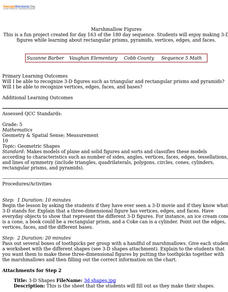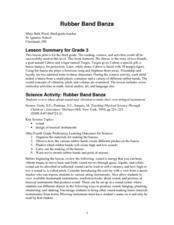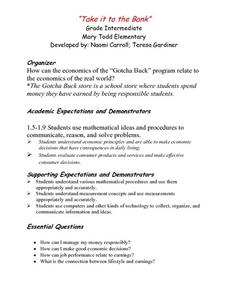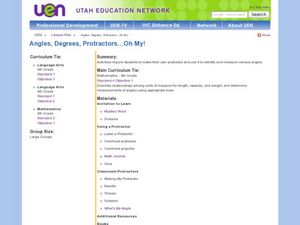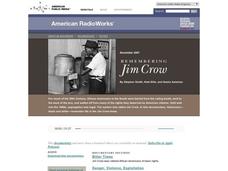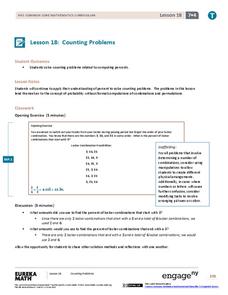Curated OER
Fun With Sorting and Classifying
Using a variety of activities, kindergartners explore sorting and classification. Learners engage in an online sorting activity, read books involving classification, and create their own class book. This is a marvelousway to explore this...
Utah Education Network (UEN)
Geo Shapes
Invite your first graders to compose and decompose two and three-dimensional figures with this fun, hands-on lesson. They investigate and predict the results of putting together and taking apart two-dimensional shapes with rubber bands...
Computer Science Unplugged
Twenty Guesses—Information Theory
How do we determine how much information to include and what can be left out? By playing a game of 20 questions, the class generates the best strategies for finding a number. They then move on to guessing the next letter in a short...
K5 Learning
Mixed Practice Word Problems #3
Seven word problems make up this mixed practice worksheet. Learners perform operations of addition and subtraction to solve problems using numbers up to 2,800.
Curated OER
Marshmallow Figures
Students enjoy making 3-D figures while learning about rectangular prisms, pyramids, vertices, edges, and faces. After a lecture/demo, students use marshmallows, toothpicks and a worksheet imbedded in this lesson to create 3 dimensional...
Curated OER
Rubber Band Banza
Third graders review ideas about sound and vibration to make their own stringed instrument. They review what a pictograph and bar graph are. Pupils conduct a survey within the classroom to choose the four favorite string instruments and...
Curated OER
Missing Number
First graders examine how to use a symbol and shape variable to represent a missing value in a mathematical equation. They listen to the book "Fish Eyes" and "One Less Fish," and observe the teacher write an equation represented for each...
Curated OER
Exploring the Sky: Reading Maria's Comet
Discover the science behind astronomy. After reading the book Maria's Comet, which is about a young woman who breaks new ground by becoming a female astronomer, young learners practice reading comprehension with worksheet questions about...
Growing Minds
Apple Exploration
Turn your classroom into a farmers' market! Reading Applesauce Season by Eden Ross Lipson or Monica Wellington’s Apple Farmer Annie, launches this investigation of apples, farmers' markets, and the people selling products. The class...
K5 Learning
Mixed Practice Word Problems #9
Reinforce math concepts of multiplication, division, area, cups, and perimeter, with a mixed practice worksheet that offers five word problems.
Curated OER
Take It To the Bank
Examine how the economics of a school store relate to real world economics. Elementary students explore various websites, complete a Venn diagram, create a schedule of wages for the students, read the book "A Chair For My Mother" and...
Curated OER
A Weigh we Go!
Here are some cross-curricular activities whil should help your kids understnad weight measurements and grammar. In this grammar and math lesson, students read the book Skittles Riddles and practice counting and balancing skittles. They...
Curated OER
Estimation
Select items to purchase from a store, add up the total cost, then estimate the total cost! Kids count out the money needed to make the purchase and pay for the items. An excelent way to connect real life math and estimation!
Utah Education Network (UEN)
Angles, Degrees, Protractors . . . Oh My!
Fourth and fifth graders make a protractor and identify various angle types. In this protractor and angle lesson, learners make their own protractor and use it to measure a variety of angles. They complete worksheets while identifying...
Curated OER
World of the Pond
Field trip! The class will review what they know about organisms that dwell in freshwater ponds, then trek down to the old water hole to collect specimens for examination. This includes several web links, useful tips, and an excellent...
Curated OER
Probability
How likely is a new baby to be a boy? Or for snow to fall in August? Mark the likelihood of various events on probability lines. For extra practice, have your fourth and fifth graders make up different scenarios in their lives to...
Curated OER
Introduce Vocabulary: George's Store at the Shore (Bassede)
Combine counting and vocabulary using Francine Bassede's book George's Store at the Shore, which has learners exploring new words and numbers 1-10. Suggested words for this text are: arrange, assortment, customers,...
Illustrative Mathematics
Bookstore Account
We use debt often to describe negative numbers and your learners will be able to see how it translates into math. They will be asked to go through a series of transactions and make simple equations for each one, following it with a...
EngageNY
Drawing a Conclusion from an Experiment (part 1)
Challenge your classes to complete an experiment from beginning to end. Learners make their own hypotheses, collect and analyze their own data, and make their own conclusions. They are on their way to becoming statisticians!
Utah Education Network (UEN)
Mathematics: Growing Patterns
Learners graph growing patterns using ordered pairs on a coordinate grid. They read The Fly on the Ceiling, a Math Myth.
Curated OER
Investigation - Staci's New Car
Students study a shopping problem. They discuss strategies for determining the number of possible choices. They create a tree diagram and an organized list. Students analyze patterns and derive an equation for the multiplication principle.
Curated OER
Palindromes
In this math activity, students solve 56 multiplication problems. Students read about palindromes and discover patterns in multiplying by 11's and multiplying 8-digit numbers.
Curated OER
Chances Are...
In this math worksheet, students perform 2 math investigations pertaining to probability--flipping pennies and rolling dice. Students record on the worksheet the results of each attempt, then graph the results. Note: The directions...
EngageNY
Counting Problems
Solving these percent problems is a matter of counting. Pupils find percents by counting the number of events that meet the criteria and the total number of possibilities. Participants create the ratio and convert it to a percent to...






